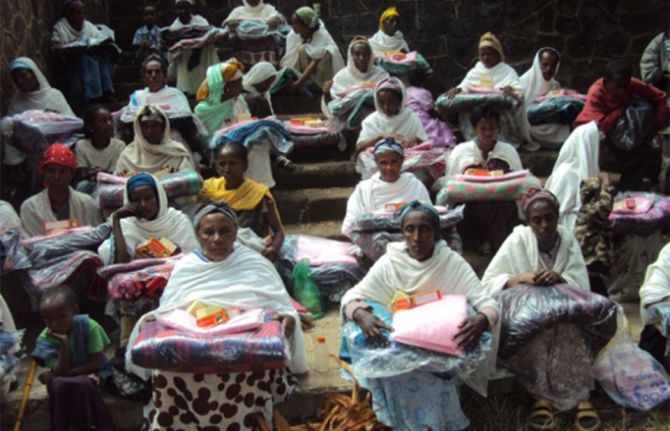
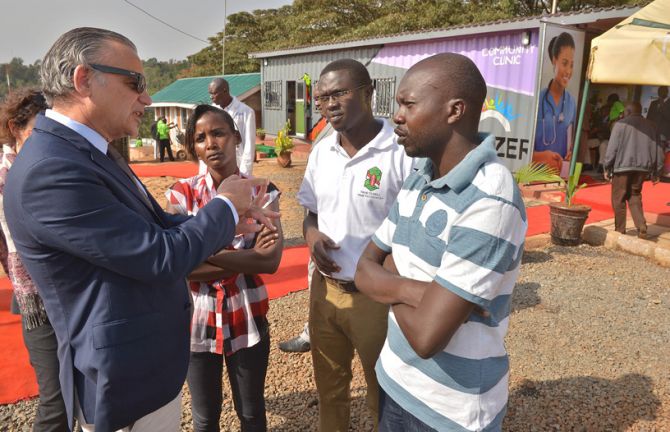
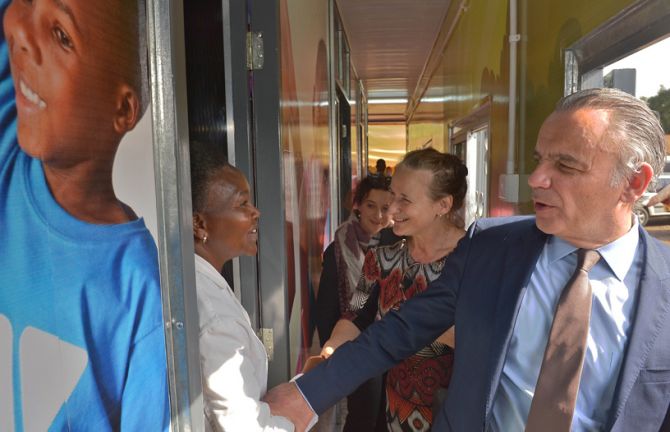
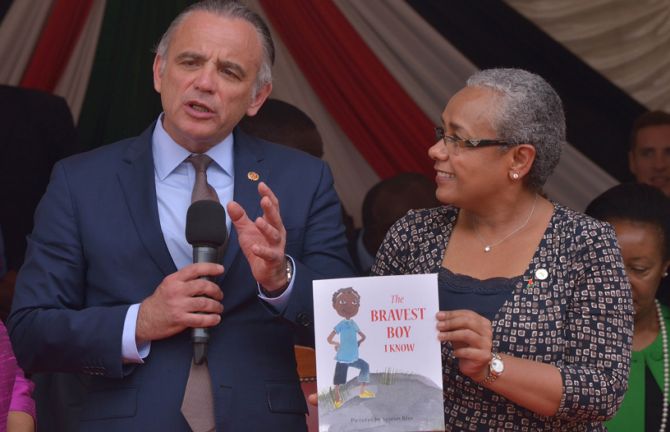
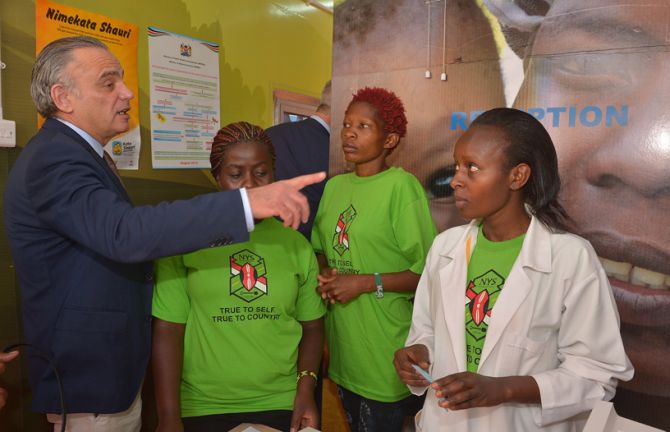
Update
The First Lady of Kenya champions access to health services in the communities
16 February 2015
16 February 2015 16 February 2015The First Lady of Kenya, Margaret Kenyatta, and UNAIDS Deputy Executive Director Luiz Loures visited a Beyond Zero mobile health clinic in Kibera, an unofficial settlement in Nairobi that is home to more than a million people.
The mobile clinic is one of 18 around the country opened as part of Ms Kenyatta’s Beyond Zero campaign, which aims to boost efforts to eliminate new HIV infections among children and improve maternal survival rates by the end of 2015 among some of Kenya’s most vulnerable communities. Beyond Zero provides comprehensive medical services to residents, complementing care received at other facilities.
The clinic was established with the support of National Youth Service workers and young volunteers from the community itself. Half of Kibera’s residents are under 15 years old and youth unemployment rates are extremely high. Most residents of the settlement earn less than a dollar a day.
Quotes
“It is gratifying to see vulnerable groups that were previously unable to access medical services doing so through the community clinic. This initiative will serve as a model to emulate for other informal settlements.”
“We have the science and the knowledge to end the AIDS epidemic. The way to do this is to bring services to the heart of communities and to the people that need them most. That is what I have seen today in Kibera.”
Region/country
Related

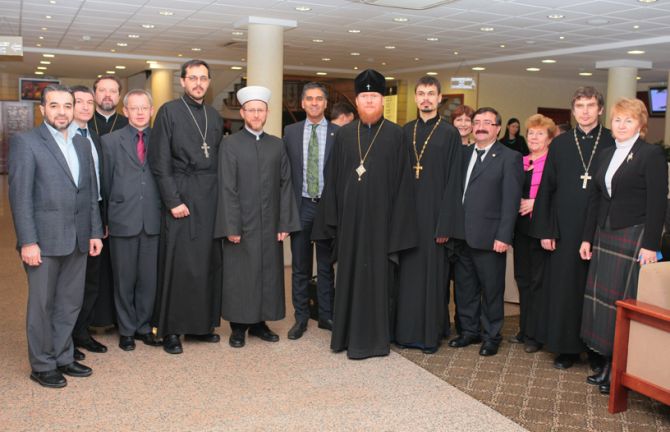
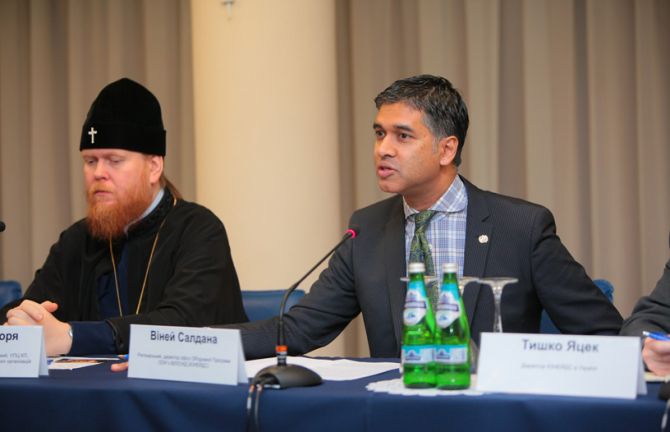
Update
Religious leaders and faith-based organizations reinforce their role in the AIDS response amid Ukraine's humanitarian crisis
13 February 2015
13 February 2015 13 February 2015Representatives of the All-Ukrainian Council of Churches and Religious Organizations (AUCCRO), a forum of 19 confessions and faiths united, met in Kiev, Ukraine, to highlight the urgent needs of people affected by HIV in eastern Ukraine.
With support from UNAIDS, the meeting was attended by senior religious leaders and faith-based organizations from 19 different confessions and religious faiths, as well as people living with HIV, civil society, government officials and other national stakeholders.
In his opening remarks, the Archbishop of Chernihiv and Nizhyn, Ukrainian Orthodox Church of the Kyivan Patriarchate, called for urgent and coordinated efforts across all faiths to support people affected by HIV during the conflict in eastern Ukraine.
Nataliya Nizova, Director of the Ukrainian Center for Socially Dangerous Disease Control of the Ministry of Health of Ukraine, presented the latest data on HIV in Ukraine. After a promising trend in the reduction of new HIV infections in 2013, Ukraine reports an alarming renewed increase in HIV infections. In 2014, 18 781 new HIV infections were officially reported, with over 55 700 people receiving antiretroviral therapy and over 8000 people receiving opioid substitution therapy. Ms Nizova also highlighted the urgent risk of treatment interruptions facing 13 500 people living with HIV in the conflict-torn regions of Donetsk and Lugansk.
In 2005, AUCCRO developed a common HIV policy for churches and religious organizations and established a partnership dialog with governmental institutions and nongovernmental organizations to advance the AIDS response in Ukraine.
The meeting participants agreed that the military conflict in eastern Ukraine promoted an urgent review of AUCCRO’s AIDS strategy in order to address the rapidly deteriorating humanitarian and health situation facing people affected by HIV.
The forum adopted a resolution that calls on members and faith-based organizations to consolidate efforts and strengthen partnerships in support of the national AIDS response.
Quotes
"We consider the HIV epidemic as one of the major challenges for our society in this critical time. During this humanitarian crisis, we confirm our commitment to the AIDS response and to doubling our support for people affected by HIV."
"The work of the All-Ukrainian Council is a beacon, shining light and giving hope to people living with HIV in eastern Ukraine in need of emergency support. We will not reach our goal of ending the AIDS epidemic without a renewed partnership with religious leaders and faith-based organizations across eastern Europe and central Asia and around the world."
“The history of the AIDS response in Ukraine is the story of people fighting for their lives. These are people like me that today, more than ever, look to churches and religious leaders for guidance and support.”
Region/country
Related


Update
African First Ladies recommit to eliminating mother-to-child transmission of HIV and ending the AIDS epidemic by 2030
11 February 2015
11 February 2015 11 February 2015In the 14th General Assembly of the Organization of Africa First Ladies Against HIV/AIDS (OAFLA), held on 31 January on the sidelines of the 24th African Union Summit in Addis Ababa, Ethiopia, African First Ladies reaffirmed their commitment to the elimination of mother-to-child transmission of HIV and to ending the AIDS epidemic by 2030. The First Ladies also highlighted the importance of paediatric care, strengthening of partnerships and ensuring that AIDS is a strong component in the post-2015 development agenda.
The OAFLA General Assembly was addressed by Yoo (Ban) Soon-taek, who emphasized that women, including young women, adolescent girls, women of child-bearing age, sex workers and transgender women, are a key population in the continental AIDS response and require focused and strategic interventions if we are to end the AIDS epidemic by 2030. She also called for a reinvigorated campaign against new infections among children.
Since the establishment of OAFLA in 2002, African First Ladies have advocated for and raised awareness on AIDS, championing many campaigns on eliminating mother-to-child transmission of HIV, underlining the burden of HIV on women and strengthening networks of people living with HIV.
Quotes
“This is not the time to relent and I commend African First Ladies for joining UNAIDS in boldly calling for the end of AIDS by 2030 and ensuring that HIV and AIDS are a firm part of the post-2015 agenda.”
“Africa needs women, women who are healthy and peaceful, to achieve sustainable socioeconomic development. Therefore, let OAFLA be more aggressive in working alongside our governments to bring women on board.”
“Women are a key population that requires a specific focus if we are to end the AIDS epidemic by 2030. We as partners can end AIDS as a public health threat across the continent by 2030, but to do this, we must re-engage ourselves, our leaders and our partners.”
“Eliminating mother-to-child transmission is a critical component to ending the AIDS epidemic by 2030. By stepping up efforts for this we are not only empowering women and mothers, but we are empowering our children, our families, our communities and our countries towards an AIDS-free generation. UNAIDS stands ready to provide all the necessary support to African First Ladies towards scaling up our joint efforts to eliminate mother-to-child transmission in 2015.”
Region/country
Related

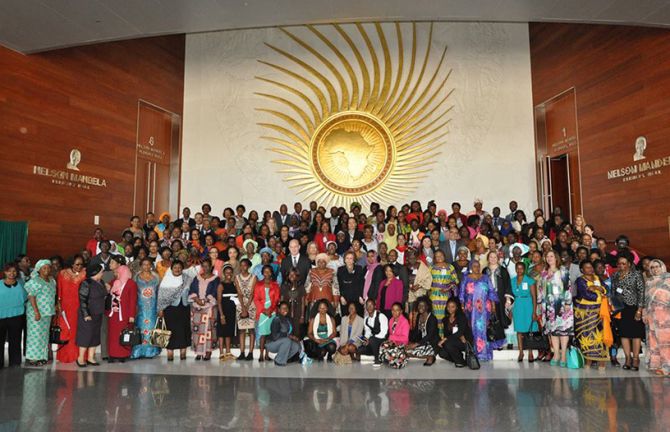
Update
African leaders reaffirm commitment to the AIDS response and women’s empowerment
11 February 2015
11 February 2015 11 February 2015The 24th Summit of the African Union and related events reaffirmed that Africa is committed and will remain committed to women’s empowerment and to ending the AIDS epidemic by 2030. The Summit took place in Addis Ababa, Ethiopia, from 23 to 31 January 2015 under 2015 annual African Union theme of “Women empowerment and development towards Africa’s Agenda 2063”.
The importance of ending AIDS was particularly articulated during the gender pre-summit meeting, at which the participants noted that member states should ensure that ending the AIDS epidemic by 2030 is part of Agenda 2063 and that it has an inclusive human rights approach that leaves no one behind, including children, adolescents, women of child-bearing age and women and girls in conflict and post-conflict settings.
The participants at the pre-summit meeting also noted that member states should ensure that the sexual and reproductive health and rights of African women are implemented without renegotiation of their content.
The Summit adopted Agenda 2063, the African Union vision of the next 50 years, and endorsed the formation of the African Group of Negotiators on the Post-2015 Development Agenda, the single negotiating body acting on behalf of the continent.
Quotes
“We should spare no effort to accelerate progress towards achieving the Millennium Development Goals, or to get as close as possible to doing so in the remaining time.”
“Affordable, quality health care must be a central feature of Africa’s development agenda. The remarkable success of efforts to combat AIDS across the continent show what we can achieve by acting together.”
“We must invest in our people—their health and education, access to water and sanitation—and build resilience and public health systems in order to defeat diseases like Ebola, as well as malaria and HIV.”
“Ending AIDS is achievable if we reduce gender inequalities, including violence. Gender equality requires social transformation, which starts with political leadership and dedicated action.”
Region/country
Related

Update
Nigeria passes law to stop discrimination related to HIV
11 February 2015
11 February 2015 11 February 2015The President of Nigeria, Goodluck Jonathan, has signed a new antidiscrimination bill into law that protects the rights and dignity of people living with HIV.
The HIV/AIDS Anti-Discrimination Act 2014 makes it illegal to discriminate against people based on their HIV status. It also prohibits any employer, individual or organization from requiring a person to take an HIV test as a precondition for employment or access to services.
It is hoped that the new law will create a more supportive environment, allowing people living with HIV to carry on their lives as normally as possible. More than three million people are living with HIV in Nigeria.
Quotes
“This is good news coming from the President to Nigerians living with HIV. We appreciate this unprecedented development, as it will help halt all HIV-related stigma and discrimination in the country and improve the national response.”
“The signing of the antidiscrimination law by the President of the Federal Republic of Nigeria is a much welcome action in the fight against AIDS. It will help more Nigerians to seek testing, treatment and care services without fear of facing stigma and discrimination.”
“By signing the antistigma bill into law, the Government of Nigeria, under the leadership of President Jonathan, has given to all Nigerians living with or affected by HIV a guarantee to access justice and to regain their human rights and dignity in society while enjoying productive lives. Zero discrimination is the only environment conducive to ending the AIDS epidemic by 2030.”
Region/country

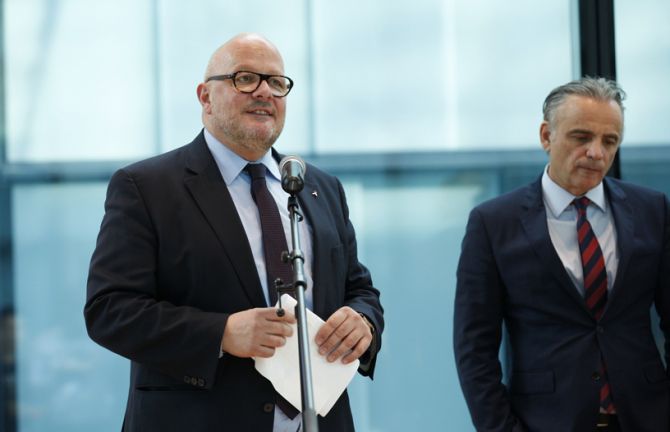

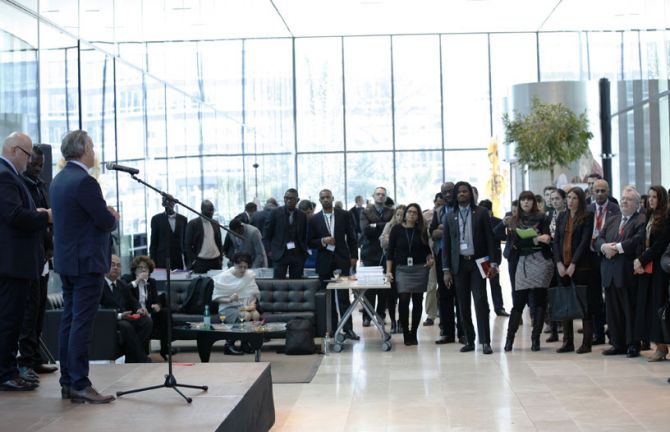
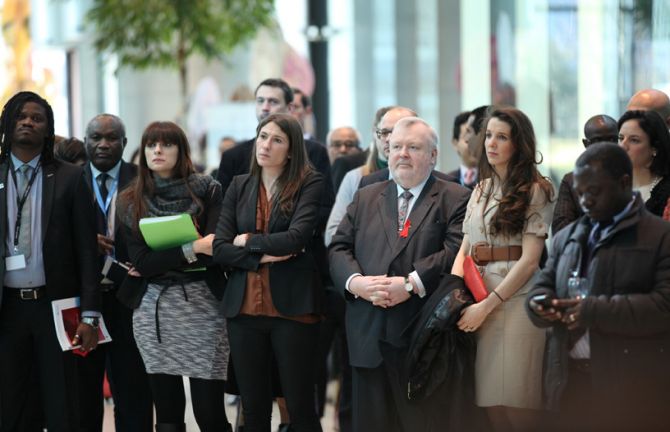
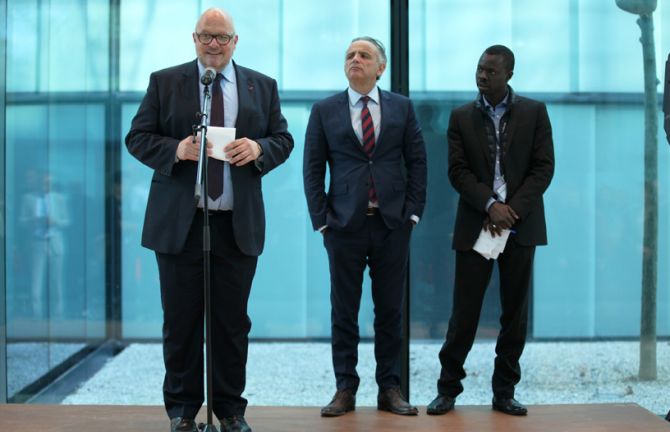
Update
UNAIDS and Luxembourg launch partnership on the 90–90–90 treatment target
10 February 2015
10 February 2015 10 February 2015Luxembourg and UNAIDS have officially launched their partnership to accelerate progress towards the implementation of the 90–90–90 target.
The collaboration between Luxembourg and UNAIDS on the target was announced at the UNAIDS Programme Coordinating Board meeting held in December 2014. The partnership will entail the organization of high-level thematic consultations to generate political, technical and strategic recommendations to help countries achieve the treatment target.
The first such consultation will be a technical meeting jointly organized by UNAIDS, the Centers for Disease Control and Prevention and Luxembourg, to be held on 10 and 11 February in Geneva, Switzerland. The event aims to generate a clear action agenda to close the HIV testing and treatment gap for key populations at higher risk of HIV infection, such as men who have sex with men, people who inject drugs, prisoners, sex workers and transgender people.
Under the 90–90–90 treatment target, 90% of all people living with HIV will know their HIV status, 90% of all people with diagnosed HIV infection will receive sustained antiretroviral therapy and 90% of all people receiving antiretroviral therapy will have viral suppression by 2020. Modelling suggests that achieving this ambitious target will enable the world to end the AIDS epidemic by 2030, which in turn will generate profound health and economic benefits.
The recommendations of the series of thematic consultations will be used to help to achieve the 90–90–90 targets and to address the remaining challenges in the global AIDS response, such as inadequate diagnostic services, inefficient deployment of health professionals and the availability of HIV services for key populations and children.
Luxembourg is highly committed to its development cooperation efforts, being one of the few countries to still allocate 1% of its gross national income to official development assistance (ODA). The country focuses on a number of priority sectors in its development work; with over 12% of total ODA, health is the most important.
Quotes
“By having agreed to champion this ambitious target, I am counting on Luxembourg’s support to spearhead a true political movement around the world where the international community is committed to addressing the remaining challenges and ultimately ending the AIDS epidemic by 2030.”
“Ending the AIDS epidemic by 2030 requires us to put into action the very ambitious 90–90–90 target for all, including key populations. Luxembourg is proud to take on this championship challenge and will work to make sure no one is left behind.”
Region/country
Related

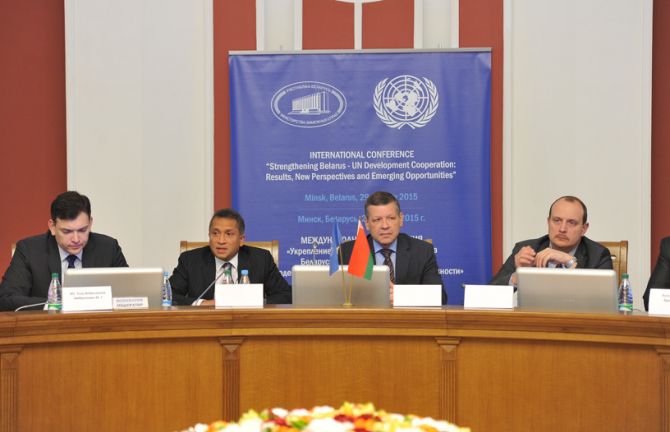
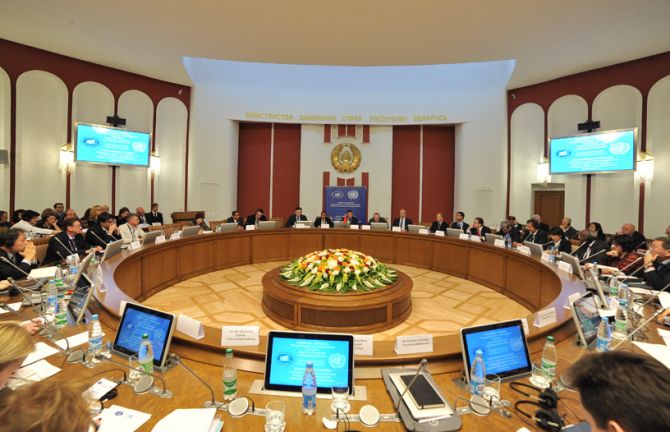
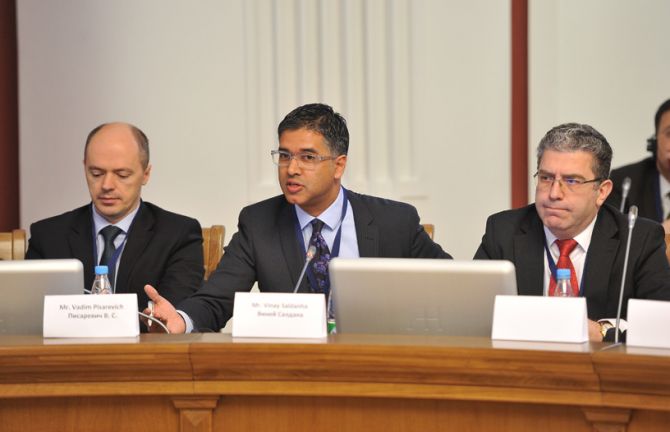
Update
Ending the AIDS epidemic in Belarus: joint commitments and joint efforts
10 February 2015
10 February 2015 10 February 2015Almost 300 stakeholders involved in the provision of international development assistance in Belarus have taken part in an event in Minsk to review national progress in meeting the Millennium Development Goals and to consider the country’s post-2015 agenda.
The conference, Strengthening Belarus–United Nations Development Cooperation: Results, New Perspectives and Emerging Opportunities, brought together representatives of the government, nongovernmental organizations, the private sector, academia and faith-based organizations as well as 24 United Nations agencies and 40 foreign development partners.
Participants heard that, although the goal of reversing the AIDS epidemic by the end of 2015 will not be achieved, there has been significant progress in the country’s AIDS response in recent years. Around 6000 people living with HIV are on antiretroviral therapy in the country.
Through the close collaboration of the Ministry of Health, the Ministry of the Interior, civil society organizations and international development partners, Belarus is also pioneering the provision of opioid substitution therapy. Around 20 clinics offering such therapy have been opened since 2007.
One of the greatest challenges for Belarus is to sustain progress in its response to HIV, despite the decrease in international funding. However, the government has said that the AIDS response remains a priority, as reflected in the country’s United Nations Development Action Framework, with the authorities prepared to consider a gradual increase in national funding.
The United Nations and other international development partners also reaffirmed their commitment to supporting Belarus in implementing the post-2015 agenda, including its efforts to advance the end of the AIDS epidemic by 2020.
Quotes
“The response to HIV and AIDS remains central to the newly developed United Nations Development Assistance Framework for Belarus for 2016–2020. The United Nations stands ready to further support the country’s development efforts.”
“Belarus can be the first country in eastern Europe to end the AIDS epidemic as a public health threat by 2020. Belarus cannot miss the chance to make history and save the lives of thousands of people.”
Region/country
Related

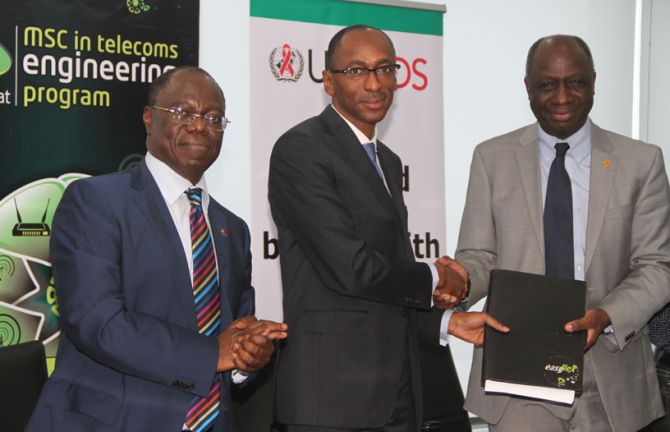
Update
UNAIDS and Etisalat join together to stop mother-to-child transmission of HIV in Nigeria
06 February 2015
06 February 2015 06 February 2015The telecommunication company Etisalat Nigeria is partnering with UNAIDS to help disseminate information about the elimination of mother-to-child transmission of HIV in Nigeria.
Under the arrangement, Etisalat Nigeria’s 21 million subscribers will receive regular information through SMS text messaging on how to prevent mother-to-child transmission of HIV and where to seek relevant health-care services.
The two-year initiative will support the efforts of Nigeria’s National Agency for the Control of AIDS to increase the number of pregnant women seeking prevention of mother-to-child transmission of HIV services in the country.
In 2013, Nigeria accounted for 22% of mother-to-child transmission of HIV cases globally. In November 2014, Nigeria unveiled its national operational plan for the elimination of mother-to-child transmission of HIV for 2015–2016, which bolsters efforts to stop new infections among children and keep their mothers alive. The plan will help Nigeria to end mother-to-child transmission of HIV by 2020.
Quotes
“We are happy to partner with UNAIDS and the National Agency for the Control of AIDS for this unique cause. We recognize that a nation can only be economically buoyant if it has a healthy population.”
“This initiative is bound to avail more avenues of stopping new HIV infections in Nigeria. We welcome this new impetus Etisalat is bringing to the HIV response in Nigeria.”
“Ending the HIV epidemic among children in Nigeria by 2020 will result in preventing 240 000 new HIV infections among children and an additional 460 000 new HIV infections among adults. In all, we are looking at preventing 340 000 AIDS-related deaths and a net benefit of US$ 30 billion, with 12 million life-years gained.”
Region/country

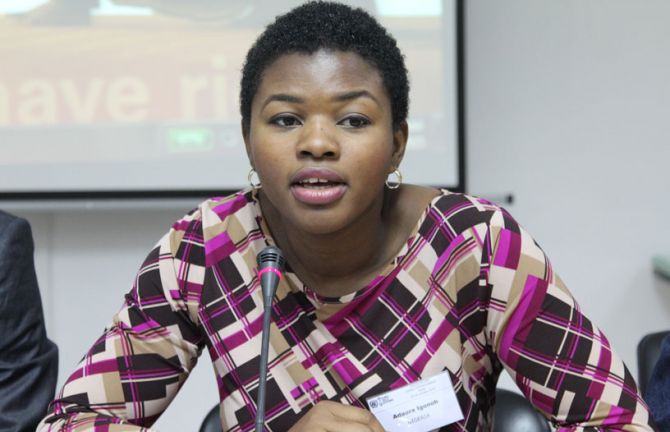
Update
Towards a programme to support Ebola survivors
29 January 2015
29 January 2015 29 January 2015The World Health Organization reports that the Ebola outbreak in West Africa has so far claimed 8800 lives. Almost 500 of the dead were health-care workers. However, the worst is over—fewer than 100 new cases were reported in the week up to 25 January and the international response is now moving from slowing transmission to ending the epidemic.
As the number of new Ebola infections continues to fall in Guinea, Liberia and Sierra Leone, survivors are organizing themselves in associations and groups to facilitate their reintegration and rehabilitation in the community.
Estimates put the number of survivors at between 5000 and 10 000. According to their accounts, survivors are experiencing various forms of stigma from extended family and the wider community. Livelihoods and earning potential have been adversely affected. In the case of children and adolescents, stigma has prevented or inhibited family reunification or placement.
The United Nations Mission for Ebola Emergency Response (UNMEER) held a meeting from 29 to 30 January in Dakar, Senegal, to discuss how the United Nations can integrate a new survivor component into its work and coordinate interagency efforts to ensure that no survivors are left behind. The meeting brought together Ebola survivors from Guinea, Liberia, Nigeria and Sierra Leone and about 50 representatives from the United Nations, including UNAIDS.
It was proposed that support for survivors would extend beyond distributing benefit packages upon leaving a health-care facility and would last for a longer period of time. Initial support might include blankets, cash and food, but mental health and psychosocial support for survivors and their family members could be part of a more comprehensive package.
Quotes
"Survivor stories are valuable now and for future outbreaks."
"We as survivors are the biggest untapped resource in the Ebola response."
“As people who were cured of Ebola, we would like to be fully involved in UNMEER activities.”
“We must learn from the HIV response and focus on a mutisectorial approach that includes civil society and government.”
“The number of survivors increases as cases and infection decline. Over time, a programme for survivors has emerged organically in the absence of a programmatic framework. It is about time for the United Nations to work with survivor communities and constituencies.”
Related information
Region/country

Update
Report provides guidance for countries adopting national health identifiers
29 January 2015
29 January 2015 29 January 2015UNAIDS and the United States President’s Emergency Plan for AIDS Relief (PEPFAR) have issued a report—Considerations and guidance for countries adopting national health identifiers—offering guidance on how to improve service delivery through the adoption of national health identifiers (NHIDs).
NHIDs ensure that each patient has a unique identity within the health system. Treatment information across services can therefore be tracked at the individual level, ensuring that detailed personal medical records can be kept, which becomes increasingly important as greater numbers of people access health care.
Individual data can be collated to provide a bigger picture, facilitating the monitoring and evaluation of the effectiveness and efficiency of health services at the local, regional and national levels. In turn, this should enable more informed policy-making and a better integration of services.
The report provides a comprehensive guide to NHIDs, including sections on the roles and responsibilities of different actors during implementation, confidentiality, security and privacy concerns and considerations for estimating the resources needed to implement and maintain NHIDs.
Quotes
“The development and implementation of national health identifiers is fundamental if country policy-makers want to be able to track the use, cost, outcome and impact of health services across facilities and time. However, these identifiers need to be devised and implemented in such a manner that the confidentiality and security of such personal health information remains protected at all times”.







